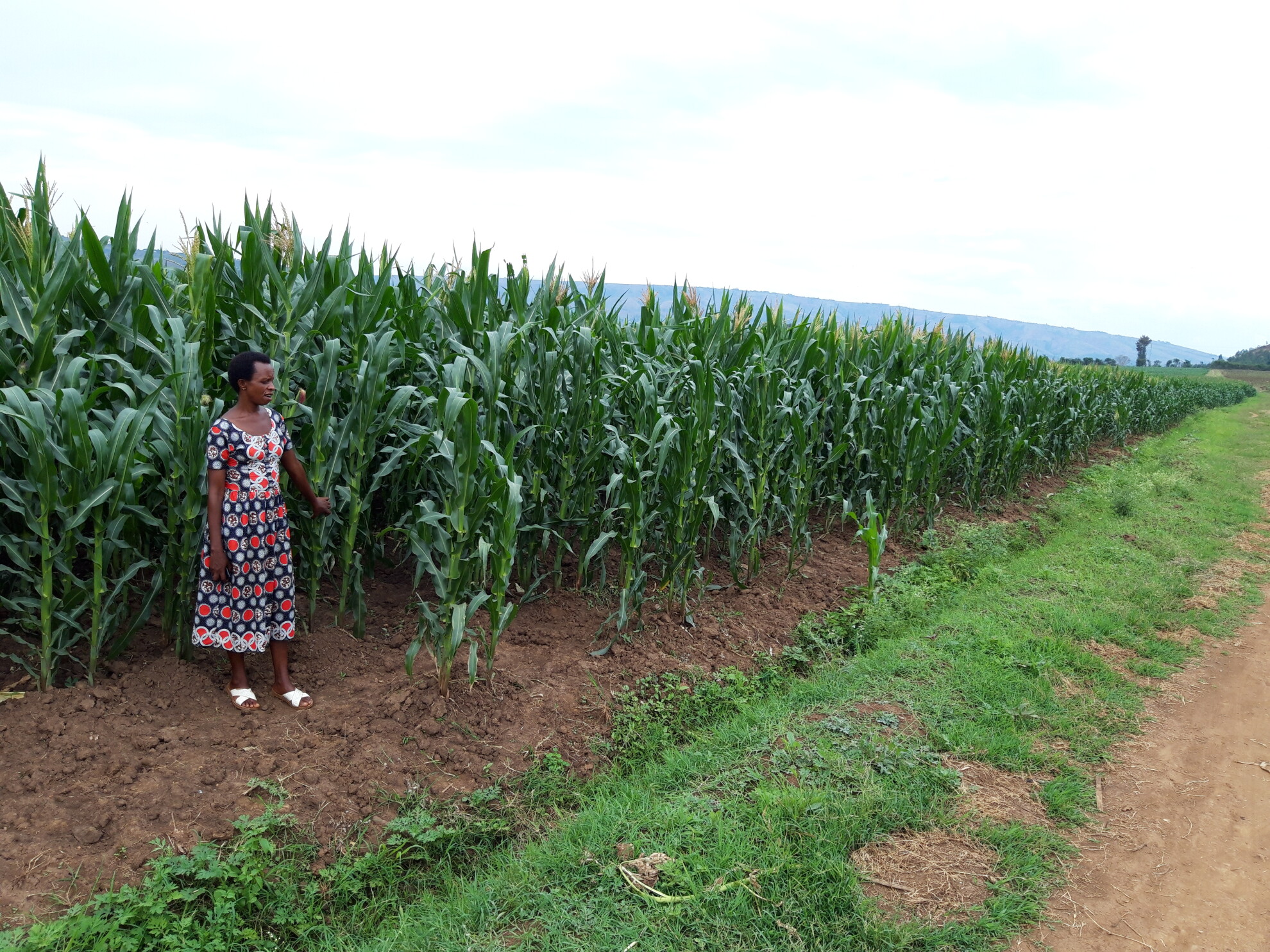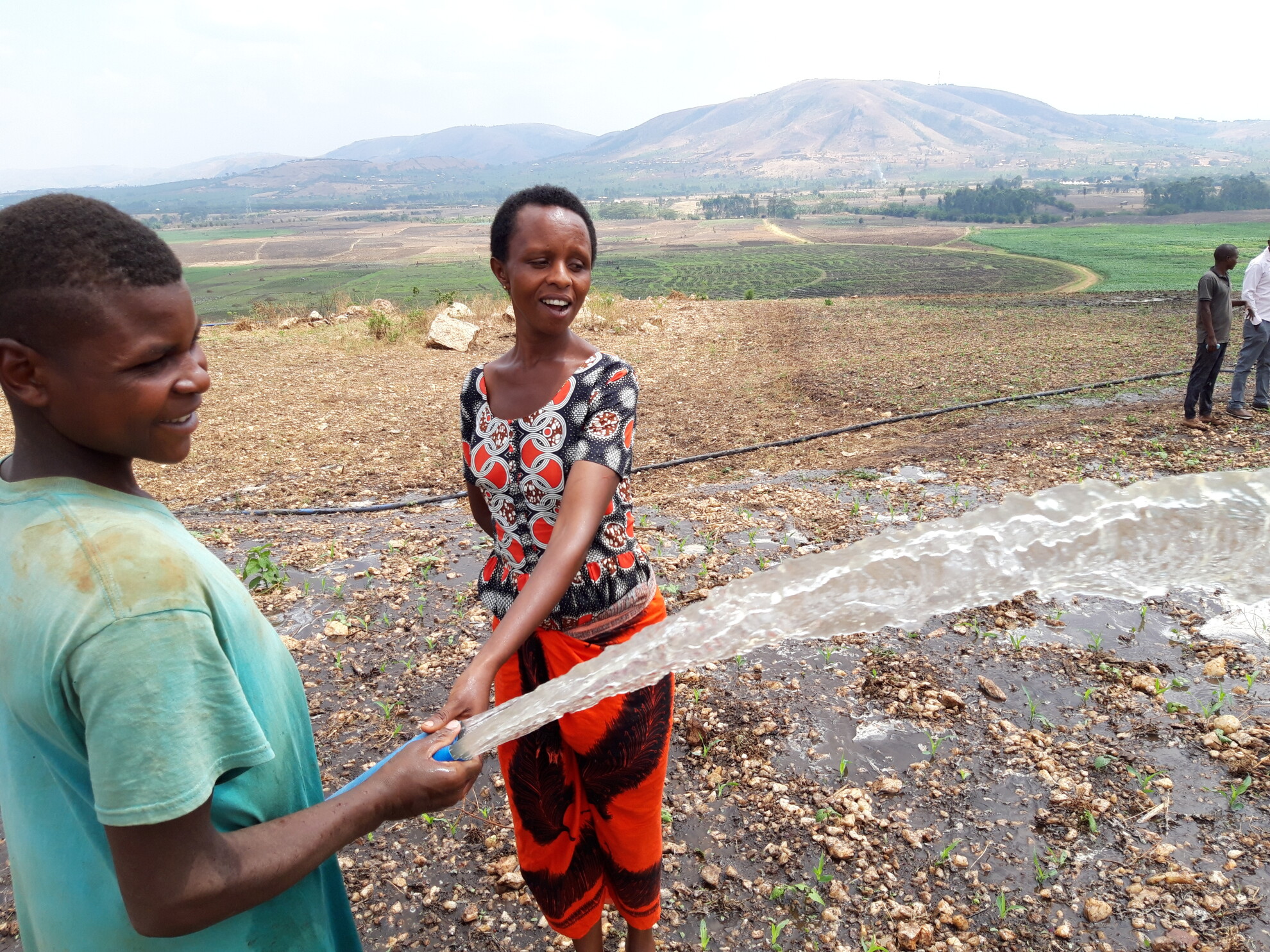From maize fields to dreamed vision
04-03-2024The inspiring success story of Fiona Ingabire, a woman who transformed adversity into triumph!
Born into a modest and impoverished family, Fiona’s journey is a demonstration of what is possible with hard work, dedication, and the pursuit of dreams.
Fiona’s story begins in Kagitumba on the bank of Umuvumba river bordering Uganda and Rwanda. Born in 1989, Fiona is a married woman and a mother of two sons and one daughter, three kids into whom lay her reason to live as she declared.
As financial constraints loomed over their household, casting a shadow of uncertainty over their future, Fiona’s spirit remained undeterred. Early on, she understood that agriculture offered the opportunities for a brighter future. Since 2013, she has been one of the founding members of KABOKU.
“Before joining the cooperative, in traditional farming we used to combine like four crops in one slot of land, but through the cooperative we learned to specialise in one crop that give a satisfactory yield” indicated Fiona. She added “Recently the market for our produce improved, our cooperative brought in new customers with the best offers and now we are assured of a sales market even before starting our farming activities.”
Through the SDGP maize project, (a consortium of Agriterra, AIF, Sight & life, and Minagri) members of KABOKU learned good agriculture practices, such as the production and the use of organic compost made of locally available materials. They also gained insights into post-harvest handling, and were introduced to the cob model. Members improved their maize productivity through demo plots as well.
Besides the above intervention, Agriterra strengthened governance and financial management through trainings of cooperative organs. All those elements worked for the benefit of farmers like Fiona and contributed to her success. Her income from maize farming increased as a result of achieving higher yield. The average yield, which was once 5 tons per hectare, has now increased to an impressive 9 tons per hectare.
She noted that selling maize on the cob reduced post-harvest losses, resulting in fewer rejections due to aflatoxin contamination.
“I do not even recall the last time I experienced rejections based on aflatoxin. We have now adopted the cob model and this model has reduced our time and works related to harvest handling”, stated Fiona.
The market of maize is flourishing as different buyers are competing to get the big share of the maize production. Fiona was one of KABOKU members who knew how to take advantage of this movement.
Planting seeds of success
Despite the demanding nature of agricultural work, Fiona’s tenacity shone through. She tirelessly tilled the land, sowed seeds, and nurtured crops, working long hours under the scorching sun. Her commitment caught the attention of fellow farmers and cooperative leaders, who recognised her diligence and dedication. Over time, Fiona’s reputation as a hardworking and reliable individual grew, earning her respect and trust within the cooperative and her community in Kagitumba.

Generatng income
In 2013, she engaged in farming activities by leasing a plot of land. Initially, the rental fee was set at 200,000Rwf per hectare. However, with the passage of time, the same size of land now commands a leasing fee of 600,000Rwf. Since then, her crops have thrived under her diligent care, resulting in abundant harvests that not only sustained her family but also generated income. With each passing season, her financial stability grew, enabling her to expand her savings. Through unwavering dedication and prudent decision-making, Fiona managed to accumulate savings that were beyond her wildest dreams.
The culmination of Fiona’s efforts came recently in 2022, when she made a monumental decision – to own land for herself. Through determination and shrewd financial planning, she acquired a valuable piece of land for 13,000,000Rwf (approximately Euro 10,000); a feat that once seemed impossible. Fiona now possesses two hectares of land dedicated to maize production, in addition to two hectares she rents for the same purpose.
Fiona supplied to her cooperative 38,925kg of maize during the 2023 season with the value of 15,343,665Rwf, after all duties were deducted. She rotates maize with beans and the total annual revenue is estimated at 20 millionRwf (approximately Euro 15,000).
As her prosperity continued to grow, Fiona set her sights on another accomplishment: providing her children with quality education. With her hard-earned income, she joyfully boasted to afford the best school for her children in the neighborhood. “I didn’t have the chance to study because of poverty, but now I can pay the best school in this region for my children” declared Fiona.

Building a future
Fiona's journey is far from over. With the same dedication that propelled her from land renting to land ownership, she now sets her sights on a new goal: building a modern house that will stand as a testament to her firm determination and the boundless potential of a single person's dreams.
Asked to tell about her next milestone, Fiona responded: “When you visit me in coming years, you will find me in the modern house.” Through careful planning and unrelenting effort, Fiona is determined to create a comfortable and secure home for her family.
Her resilience in the face of adversity, her unbreakable spirit, and her unshakable determination have shown that with hard work and perseverance, even the most challenging circumstances can be overcome. Fiona's journey from poverty to prosperity is a beacon of hope, a living proof that dreams can indeed come true, no matter where you start.
As Fiona continues to shape her future with unwavering resolve, she leaves an indelible mark on the annals of cooperative’s history. Her success story has the potential to inspire far beyond the confines of her village, motivating countless others to relentlessly pursue their dreams and have faith in the potential for transformation through dedication and hard work.
KABOKU COOPERATIVE
Established in 2013, KABOKU (Kopera-tive y’Abahinzi n’Aborozi bo mu Kibaya cy’Umuvumba) is a cooperative organisation founded by a determined group of 638 members of whom 338 are men and 300 women.
The initial shared capital was 10,000Rwf but currently it is estimated at 40,000Rwf. The cooperative focused on promoting maize and vegetable farming among its members. It produces maize on area of 700ha and the productivity is between 7 and 10 tons per hectare. It also produces vegetables on 200ha.
KABOKU is among beneficiaries of the SDGP maize programme which Agriterra is implementing in Rwanda with other partners as of 2018.
One of the standout achievements of KABOKU has been its unwavering commitment to supporting its members. The cooperative has been able to provide members with crucial funds and agricultural inputs. These resources have not only improved crop quality and quantity, but have also boosted the financial stability of cooperative members, helping them navigate the challenges of rural life.
Read also the stories of other powerwomen:
